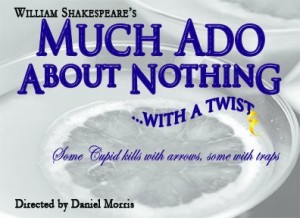 Much Ado About Nothing…With A Twist adapted by Daniel Morris, Bad Habit Productions, Deane Hall at Boston Center for the Arts, 4/28/12-5/13/12, http://www.badhabitproductions.org/shows/season/MuchAdo.html.
Much Ado About Nothing…With A Twist adapted by Daniel Morris, Bad Habit Productions, Deane Hall at Boston Center for the Arts, 4/28/12-5/13/12, http://www.badhabitproductions.org/shows/season/MuchAdo.html.
Review by Craig Idlebrook
(Boston, MA) There’s a funny story the actor Charles Grodin shares about famed acting teacher Uta Hagen, where Hagen was dissecting the terribleness of a scene Grodin had just done. She hated everything except for one moment when Grodin’s scene partner was slow to hand the actor a prop. Because there was a delay, Grodin looked genuinely concerned, and that, Hagen announced, was true acting.
I’m not a big fan of the Method myself, but I’m starting to see her point, especially when it comes to Shakespeare. Acting involves a weird combo of memorization and playful improvisation. But when it comes to the Bard’s work, too many productions are populated with actors who know they are saying weighty words and making weighty gestures; every move is preordained and dripping with importance. Such a style robs the lyrical and impish qualities of plays that once were performed for bawdy Elizabethans.
Luckily, there are productions like Bad Habit’s staging of Much Ado About Nothing to inject life into scripts that we have too long sanctified. By using triple, quadruple and even quintuple casting, director Daniel Morris keeps his cast on its toes and endows them with irreverence for the material. Set loose, they forge a night of theater that brings out both the ping-pong quality of the wordplay and the deep despair of the monologues in this great play.
The plot is filled with human foibles and hubris that would seem more unrealistic if I didn’t just spend half an hour arguing with my fiancée about who gets to use the shower first: A group of soldiers returns to Messina from a military skirmish. A duke’s evil half-brother wants revenge against the duke, a young soldier falls in love but is too tongue-tied to court his girl, and a pair of fools can’t stop arguing long enough to realize they are made for each other. If you’ve seen your share of Shakespeare comedies, you know where this is heading. The bad folks trick the good ones, the good idiotically believe the bad and a pair of silly people are duped into love.
Standard fare, but the production’s pace, thankfully, is anything but standard. Watching the costume changes is like watching a magician’s show; even when you know the trick is coming, you can’t see how the cast pulls it off time and again (kudos to designer Pamela DeGregorio). And the cast, on the whole, make it look easy to expertly pull off multiple three-dimensional characters with ease. Their combined efforts create an amazing synergy that causes ponderous pages of text to fly by as if the characters were bouncing on a trampoline. While this crisp delivery augments the comedic timing, it also makes the moments of despair all the more compelling. It’s easy to forget in the frothy script that a father must contemplate the sickening concept of death before dishonor for his only daughter; Sierra Kagen creates a show-stopping moment here with what could easily have been an SNL character with a scare wig.
Director Morris deserves credit for creating a mischievous vision of the Shakespearean mental landscape with the revolving characters and some wonderful nuanced touches. He combines modern music and the music within the script to heighten the play’s overall effect; letting us in on the joke with the songs somehow making the action more believable. One could watch this play several times and not catch all the crafty little bits, like the quiet strumming of Semisonic’s “Closing Time” during a drunken masquerade ball. But Morris’s best touch might be to have all the cast and a mannequin play a wronged ingénue lover by the name of Hero, thus underlining the concept that the character is just a powerless MacGuffin sent to move the plot along.
Drop everything and go see this play before it closes. Be irreverent with this cast and discover the true worth of this script.
